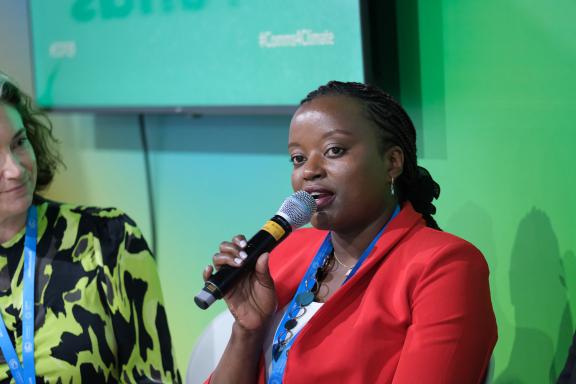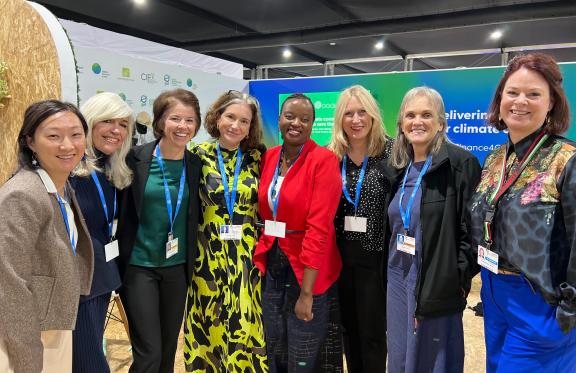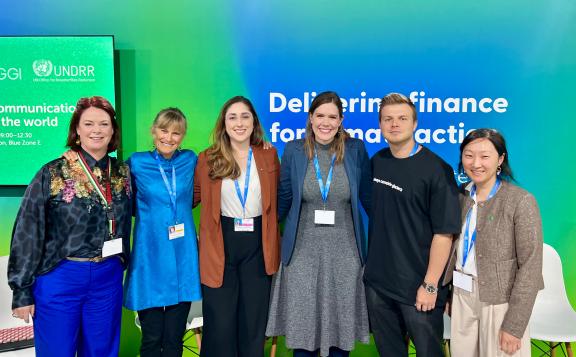On 13 November at COP29, the Green Climate Fund (GCF), in collaboration with BBC Media Action, the United Nations Disaster Risk Reduction (UNDRR), and the Global Green Growth Institute (GGGI), hosted Decoding climate communication: stories to save the world. As GCF’s first climate communication event, it aimed to highlight the transformative power of effective climate communication.

Elizabeth Kahurani, Climate Communications Specialist. Photo: GCF / Brylle James Galang
In today's media-saturated world, communication is an essential driver of climate action, serving as a catalyst for hope, advocacy, motivation, and behaviour change. Journalists, filmmakers, advertisers, creators, business leaders, and policymakers can all contribute to the climate conversation. The event showcased the potential of partnerships and diverse perspectives in communications. Discussions focused on how different communicators view their roles in the climate crisis, the impact they can make, the policies needed from leaders, and what changes are necessary to drive faster progress in climate action.
Stephanie Speck, GCF Head of Special Initiatives, kicked off the event, calling on the audience to use their voice individually and collectively to deliver more climate action to those who need it the most.

From left to right: Jinhee Dieu, Eileen O'Connor, Bernadette Woods Placky, Elizabeth Kahurani, Catherine Ellis, Daniela Chiaretti, and Stephanie Speck. Photo: GCF / Brylle James Galang
Caroline Sugg, Director of Policy, Strategy & Partnerships at BBC Media Action, led a panel on partnerships featuring prominent women leaders from journalism, meteorology, entertainment, and climate finance. The panel included Eileen O'Connor, Senior Vice President for Communications, Policy & Advocacy at The Rockefeller Foundation; Bernadette Woods Placky, Chief Meteorologist and Director of Climate Matters at Climate Central; Elizabeth Kahurani, Climate Communications Specialist; Catherine Ellis, Head of Climate Content at BAFTA Albert; Daniela Chiaretti, Environment Correspondent at Valor Economico Brazil and Amazon Advisory Committee Member.
The panellists discussed the critical role of media in building public trust in climate science and solutions, emphasising the need to engage audiences with optimism and empower them to act.

Eileen O'Connor at the Climate Funds Pavilion, COP29. Photo: GCF / Brylle James Galang
Eileen O'Connor, Senior Vice President for Communications, Policy & Advocacy at The Rockefeller Foundation, noted: "In most of the world...no one talks about climate. They understand extreme weather events but don't connect them to climate change. When they see messages of climate change, it's all very catastrophic, and that turns people off the data, and they feel hopeless... [We must] develop the narratives around solutions so that people can engage in behavioural change."
Catherine Ellis, Head of Climate Content, BAFTA Albert, added: "We work with creatives [in the entertainment and media industry]. People in soaps, actors, news, and characters that can really change behaviours at home. It's not just about the big David Attenborough nature documentaries...implicit and explicit mentions of climate change and solutions are just as important in terms of behavioural change...a soft mention such as a solar panel in the background [can be all it takes]."
Daniela Chiaretti, Environment Correspondent, Valor Economico Brazil, Amazon Advisory, Committee Member, shared interesting insights on the future of journalism: "I was talking to youth journalists, and one asked me: 'In the future, do you think we are all going to be climate journalists?'. I said no. You're going to be journalists. Climate is an integrated part of our life. You will write with this lens. If you write about sports, climate change will affect athletes, the field, and so on."

From left to right: Stephanie Speck, Jacqueline Novogratz, Natalia Alves Machado Netto, Claire Duthuit, Max Klymenko, Jinhee Dieu. Photo: GCF / Brylle James Galang
Stephanie Speck, hosted the "Perspective" session, exploring how effective communication from various angles—people, power, product, and platforms—can drive transformative climate action. Commencing the session, Stephanie said, "Communication is the critical piece of the climate puzzle. It's central to changing minds and capturing hearts, inspiring people to act."
The session featured Jacqueline Novogratz, Entrepreneur, Author, and Founder & CEO of Acumen; Natalia Alves Machado Netto, Global Business Developer & Public Affairs at Solinftec; Claire Duthuit, Communications Director at the Climate Champions Team; and Max Klymenko, Content Creator and Founder of Social Impact Communications Agency, Klym & Co.

Max Klymenko, Content Creator and Founder of Social Impact Communications Agency, Klym & Co. Photo: GCF / Brylle James Galang
Max Klymenko, Content Creator and Founder of Social Impact Communications Agency, Klym & Co, shared his message to activists and people within the climate space: "You have the passion and knowledge, but online, you're competing with Netflix, video games, creators. There are a lot of things people are watching, and CO2 emissions may not be something they are interested in. If you want to change minds, try to create change [through quality content]."
Natalia Alves Machado Netto, Global Business Developer & Public Affairs, Solinftec, added: "Solix, the robot, lives in the field. That's the concept, a technology that lives in the field that always gives insights to farmers. When we started communicating with farmers better, we developed our technologies better."

Jacqueline Novogratz, Entrepreneur, Author, and Founder & CEO of Acumen. Photo: GCF / Brylle James Galang
Jacqueline Novogratz, Entrepreneur, Author, and Founder & CEO of Acumen, expressed that climate action is possible if we can "tell stories in ways that help people see that this is real people solving real problems."
The event wrapped up with a call to build stronger coalitions in climate communication and accelerate collaborative action. It marked the first in a series of discussions aimed at fostering cross-disciplinary partnerships, amplifying impactful climate messaging, and building networks of trust as we move towards a declaration at COP30 and beyond.
Please click here for more information on the event. Watch the recording below.
Share your story: #Comms4Climate